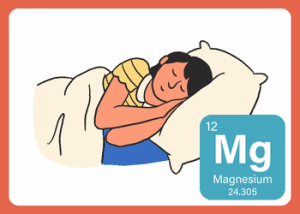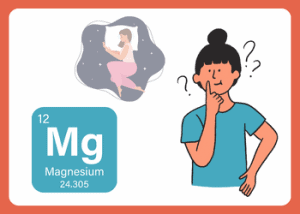Did you know that magnesium supplements can dramatically improve your sleep and relaxation? Magnesium is a vital mineral with many uses, including muscle and nerve function, energy production, and bone health. To keep these bodily functions running smoothly, it’s essential to get enough of this nutrient in our diets or through supplementation.
If you are looking for a straightforward and effective way to improve your sleep, reduce stress levels, and relax more easily, then look no further than magnesium supplements.
In this article we’ll delve into the science that explains how taking magnesium can be so helpful in promoting better rest as well as discussing all of its potential benefits.
So if insomnia is making life difficult or you simply want to upgrade the quality of your slumbering hours, make sure to consider adding magnesium supplements into your routine.
Table of Contents
When to Take Magnesium for Sleep?
Magnesium plays a fundamental role in various bodily processes, such as muscle function, nerve transmission, and bone maintenance. Additionally, there is evidence to suggest that it can be beneficial for sleep quality. Herein, we will explore the ideal time to take Mg supplements if your goal is improved sleep hygiene according to scientific studies.
Magnesium has been touted for its ability to have a soothing effect on the body, and research indicates that it could be beneficial for getting better quality sleep.
 Melatonin is a hormone responsible for regulating our sleep-wake cycle, which Mg helps to monitor. Additionally, this mineral also plays an important role in controlling GABA levels – another neurotransmitter with calming effects on the nervous system.
Melatonin is a hormone responsible for regulating our sleep-wake cycle, which Mg helps to monitor. Additionally, this mineral also plays an important role in controlling GABA levels – another neurotransmitter with calming effects on the nervous system.
To maximize its benefits, research indicates that magnesium should be taken shortly before bedtime.
To prove this theory correct, a study was conducted among elderly individuals with insomnia and it revealed amazing results- those who took the supplement 30 minutes prior to their nightly slumber enjoyed improved sleep quality compared to those on the placebo!
An investigation revealed that taking Mg tablets for eight weeks noticeably improved sleep duration and restfulness in people with insomnia. It is essential to keep in mind, however, that the appropriate timing of Mg supplementation may differ depending on each person.
Taking Mg supplements may have a variety of effects on the sleep cycle; some people experience drowsiness, while others observe no change. To ensure your safety and well-being, it is critical to speak with a healthcare professional before beginning any form of supplementation as they can interact with certain medications.
To summarize, the scientific data suggests that having Mg before bed might be a successful method to enhance sleep and reduce insomnia. However, it’s essential to keep in mind that individual outcomes could vary and one should talk with their doctor prior to starting any new supplement routine.
Does Magnesium Help You Sleep?
Magnesium is an essential mineral that has profound implications for our overall health. It influences muscle and nerve function, regulates blood pressure levels, and maintains bone integrity.
Furthermore, recent research suggests it also exerts a calming effect upon the body which may help induce sleep in those who suffer from insomnia or other sleeping disorders.
The existing scientific evidence indicates that the supplementation of Mg may be beneficial in improving sleep quality amongst a particular group.
 A study with elderly participants suffering from insomnia showed remarkable improvements in the former’s sleep pattern when an adequate dose of magnesium was taken, as opposed to individuals who had been administered a placebo pill.
A study with elderly participants suffering from insomnia showed remarkable improvements in the former’s sleep pattern when an adequate dose of magnesium was taken, as opposed to individuals who had been administered a placebo pill.
Which magnesium is best for sleep and anxiety? Magnesium glycinate appears to be the best form of magnesium for improving sleep and reducing symptoms of anxiety. How much magnesium glycinate for sleep? Typically between 200-400mg per day, taken before bedtime.
A separate study revealed that taking magnesium supplements for two months significantly bolstered sleep time and efficiency in people suffering from insomnia.
The precise way in which Mg helps you sleep is still unknown, yet it’s likely that its involvement in the production of melatonin, a hormone connected to our sleep-wake cycle, plays a role.
Furthermore, by controlling GABA activity-a neurotransmitter with calming effects on the body Mg has been proven to have an exceptionally soothing effect on your nervous system.
It’s important to recognize that individual outcomes may differ, and Mg supplementation might not be a successful option for everyone. Moreover, it’s essential to consult with your healthcare professional prior to beginning any new supplement routine as some medications can interact negatively with supplements.
Frequently Asked Questions
Which Form of Magnesium is Best for Sleep?
Magnesium glycinate, the popular combination of magnesium and amino acid glycine, has been thoroughly investigated over time to effectively treat sleep disorders while diminishing anxiety, depression, and stress.
Is it OK to Take Magnesium Every Night?
Is magnesium legitimate for sleep? Absolutely! According to Dr. Winter, an appropriate daily dosage of 100-350 milligrams should not lead to any negative outcomes or reactions. Therefore, taking this moderate amount is perfectly safe and can be beneficial when trying to achieve a better night’s rest.
How Long Before Bed Should You Take Magnesium?
Umeda suggests that you take their supplement about 30 minutes before turning it in for the night, and to make sure not to exceed the recommended dosage. Remember, taking more won’t give you better restful sleep but instead will only cause stomach distress.
How Much Magnesium Should You Take for Sleep?
Research suggests that consuming 320 to 729 mg of Mg daily may help you fall asleep more quickly each night.
How Long Does it take for Magnesium to Work for Sleep?
The time it takes for magnesium to work for sleep can vary, but some studies suggest that benefits may be noticeable within 1-2 weeks of consistent supplementation.
Conclusion
To conclude, introducing magnesium into your supplement regimen carries the potential to enhance sleep quality and calm you down. Despite more research being required to understand how it acts so beneficially, present studies point towards its ability in moderating neurotransmitters, decrease inflammation levels, as well as regulating healthy sleeping patterns.
Magnesium is a vital nutrient that can be ingested as a supplement or obtained naturally through dietary sources, aiding to promote of overall health and wellness.
